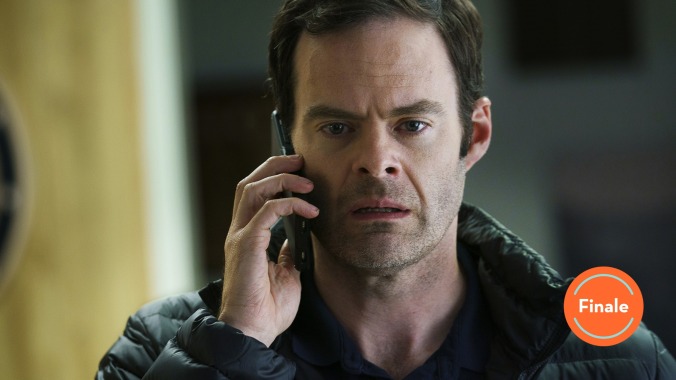In the season finale, his name is Berkman. Barry Berkman.

“Telling the truth is the right thing to do, right?”
In “berkman > block,” three characters come to the edge of an honest, epiphanic moment…and then slowly back away from it. There’s no one reason for their decisions, but rather a mixture of fear, clouded judgment, and myopia. Everyone in Barry fights to live honestly, to atone for their regrets, however minor or major they be, and move forward with a healthier, principled worldview. But every time they get close, they sabotage their own efforts. Epiphanies aren’t enough. Ultimately, follow through is required.
A stellar finale written by Alec Berg and Bill Hader, “berkman > block” caps off a great season of television by masterfully tying off every loose end, even ones that were tossed off or buried, and seamlessly connecting the series’ two worlds, thematically and narratively. What’s most impressive is that it never once feels tidy or closed off. On the contrary, the airtight writing only amplifies the emotional messiness, illustrating how the characters’ actions can’t be reduced to psychologically pat explanations. People are driven by many conflicting passions, by both positive and negative behavior, by an overwhelming self-awareness and an irrepressible impulse. Berg and Hader go to great lengths to capture the internal contradictions and their unfortunate outcomes.
It might be best to start with Sally, a person who sees herself as an artist but has never really received an opportunity to prove herself. But with Lindsay’s sold-out showcase, she finally finds the perfect venue to introduce, and expose, herself to the world. (It also certainly helps that her story is easily the best in the class and the rest of her peers will only make her look better by comparison.) At the same time, the cracks begin to show early on. She nervously smokes a cigarette as Barry arrives to the 400-seat auditorium. She putters around the space with her script, barking orders and making notes. Her confidence frays even further when she sees that Lindsay, her sincere professional advocate, is also a nervous wreck. There’s a lot riding on this scene and Sally feels every inch of it, so much that she barely registers that Barry is similarly falling apart for an entirely different, graver reason.
All the pieces are in place when Barry and Sally finally step on stage. But Sally chokes at the very last possible second. On second thought, it might have been better if she choked in the traditional sense. Instead, she throws the table aside and performs the wish-fulfillment version of the scene where she tells off Sam. Sarah Goldberg plays that moment expertly, leaning into the “screaming = good” bad-actor cliché. It’s a comfortable place for Sally, but it’s ultimately a false one that serves to self-flatter and obscure the truth, embodied by the most hackneyed exit line imaginable: “My name is Sally Jane Reed and as of today we are fucking done, you son of a bitch!”
Devastated and ashamed, Sally tries to sneak away from the showcase. Lindsay catches her and wants to take the blame for pushing her to perform such a vulnerable piece in this type of setting. Except the best and worst outcome happens: Everyone loves it. The Michael’s commend her on the hopeful, inspiring version of a story in which a woman takes charge of her life. Other patrons surround her to praise her bravery. She and Lindsay exchange embarrassed looks as the crowd swells. This might in fact be her meal ticket, the showcase that leads to the next thing that leads to the even bigger thing that puts her on the map. And it’s based on a lie.
Meanwhile, Fuches flees the woods to the monastery to assist Hank with operations and seek protection from Barry, who’s on the warpath. The problem is that Hank, following his embarrassing lack of leadership when the Burmese were about to kill them all, no longer has control over his men, and will soon be shipped back to Chechnya as punishment. Just as the Burmese and the Bolivians arrive to begin an all-out assault on the monastery, Fuches sees an opportunity to prove his worth. He walks outside to address Cristobal openly about Hank’s betrayal to prevent the siege that’s about to take place.
“You and Hank, you’re in a transitional phase. That’s all! People meet and sometimes they lock into each other, like two long-sought-after pieces of a puzzle. Now, as time goes on, these pieces, they morph and they grow, and they can grow together and become stronger, or they can become two completely different shapes that…they don’t have any room for each other, they don’t fit anymore. If there’s one thing I’ve learned in my life, you can’t control what other people are gonna do. No. They need their own space to become whatever weird-ass shape they’re going to change into. It’s nature. You can’t control it, but you can accept it. And I think, you know, you and Hank, that’s still a fit, man.”








































